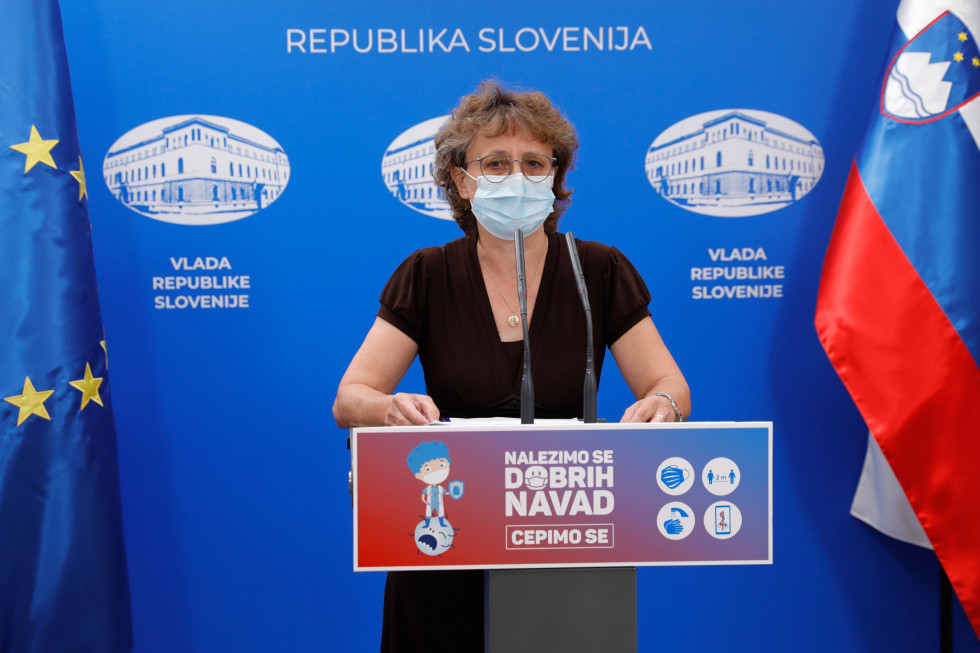Calls for responsible behaviour as mass gatherings pose a big risk for the spread of infections
A total of 1,864 PCR tests and 25,531 rapid antigen tests were carried out yesterday. The PCR tests confirmed 84 new infections. The 7-day average of positive tests stands at 59. The 14-day incidence rate surpassed 25; today it stands at 28.
A total of 39 COVID-19 patients are hospitalised, of which 10 are in intensive care units. Yesterday, no COVID-19-related deaths were recorded.
The epidemiological situation in Slovenia and around the world was presented by deputy head of the Communicable Disease Centre at the National Institute of Public Health Ms Nuška Čakš Jager.
There has been a global increase of new infections
She stressed that the numbers for week 26 show that there have been more than 184 million cases confirmed, resulting in close to 4 million deaths. There has been an increase of new infections in all regions of the world except in North America, where the numbers have been slightly decreasing. Brazil, India and Colombia recorded the most infections. The mortality rate in Africa increased by 23%.
Europe recorded a 30-percent increase in confirmed cases. Russia, Sweden and Great Britain recorded the most confirmed cases in week 26. The cumulative incidence in the European region ranged widely: from 0.2 per 100,000 inhabitants in Latvia to 148 per 100,000 inhabitants in Armenia.
Worryingly, according to Ms Čakš Jager, in the 28 countries of the WHO European Region, the 14-day cumulative incidence increased by ≥10% in week 26 compared with previous weeks.
On the prevalence of SARS-COV-2 variants worldwide, Ms Čakš Jager said that the Delta variant was spreading at fast pace and was present virtually all over the world. In the EU, the number of confirmed cases surpassed 33 million in week 26. We have also seen a slight increase in deaths, the number of which now stands at around 742,000.
There was an increase in confirmed cases from week 25 to week 26 of 2021 in the following countries: Cyprus, Finland, Ireland, Malta, Portugal, Spain, Liechtenstein. At that time, Slovenia experienced a 62.9-percent drop in cases and Europe an 8.2-percent drop. Ms Čakš Jager looks forward to last week's analysis, which will be published at the end of the week on the websites of the world's and European organisations.
On 8 July 2021, the 14-day cumulative incidence of COVID-19 cases per 100,000 population is higher than the EU average in the following countries: Cyprus (493), Portugal (240), Spain (215), Ireland (109), Romania (81,8), Greece (71), Denmark (66), the Netherlands (63,5), Belgium (55). It was 51.6 in the EU and 19.6 in Slovenia (today it is 28).
Largest share of infection is among young people, many cases are imported
In Slovenia, the average of positive results rose to 4.6 percent yesterday. There are many imported cases and imported clusters, which means that people who come from abroad infect their close contacts. The largest share of these come from Spain, some also from Croatia and individual cases from elsewhere.
The share of infected persons is highest in the age group of 15 to 24, said Čakš Jager. There are very few infected people in the age group with the largest proportion of vaccinations. The number of deaths in recent weeks is also quite low.
Preliminary results suggest the possibility of infection with the Delta SARS-CoV-2 variant
When asked about high school graduation trips, Čakš Jager stressed that mass gatherings increase the risk for the spread of the virus. It is important for people to be aware that such events pose a greater risk of spreading the infection and to behave responsibly.
122 infections and 49 secondary cases have been confirmed among Dolenjska high school students who took part in a graduation trip to Spain. By Thursday, 8 July 2021, an epidemiological investigation had been conducted on all participants of this trip, meaning that the epidemiological service called all participants, talked to them, and gave them further instructions. Preliminary results of the sample analysis suggest the possibility of infection with the Delta SARS-CoV-2 variant.
In high school students from Gorenjska, 32 SARS-CoV-2 infections among participants of the graduation trip and 2 secondary cases have been confirmed. On Friday, 9 July 2021, an epidemiological investigation was conducted on all participants of this trip. Samples of infectious materials from infected individuals were sent for sequencing. We are still awaiting results, said Čakš Jager.
Čakš Jager pointed out that recovered (within 6 months of the onset of the disease) and vaccinated persons were not quarantined. Epidemiological investigations of participants with confirmed infection and their contacts are carried out promptly and as soon as the infection in a person is confirmed.
Currently, 664 high-risk contacts have been counted between participants of the trip and those who became infected from them when the graduates returned home.


